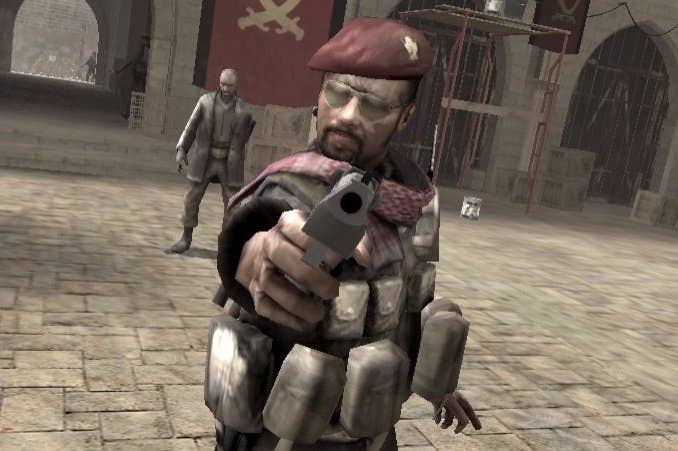GDC panel says that, in games, "Muslim blood is cheap"
Islam is too often used as a source of trouble and villainy, but diversity could help to redress the balance
"Muslim blood is the cheapest on Earth right now," according to a panel of Muslim developers at GDC, and that is reflected in the content produced by the commercial games industry.
In a sobering session at GDC last week, three game developers assessed the, "current state of Muslim representation in video games." The panel was moderated by Imad Khan, a journalist for The Daily Dot, and featured NZGDA artist Farah Khalaf, Glasgow Caledonian University lecturer Romana Romzan, and Rami Ismail, the co-founder of Vlambeer.
Though the conversation would ultimately explore some ethically complex territory, it started with an appraisal of some of the most prominent Muslim characters from games released in the last several years. From Assassin's Creed's Altaïr Ibn-La'Ahad to Salim in Uncharted 3, the panel was careful to identify both the positive and negative aspects of each choice.
"You know what I want to see? I'd like to see, one time, a game where the enemies are Americans. I don't think I've ever seen that"
Rami Ismail
However, one unifying theme was the tendency for Muslim characters to be defined by their faith; for their relationship to Islam to be an essential aspect of their role in the story. An exception to this was Faridah Malik from Deus Ex: Human Revolution, a helicopter pilot whose faith was not the controlling influence on who she was and how she acted.
That point was taken up by Romana Romzan, who wearily listed the stereotypes associated with Muslim characters, and particularly female Muslim characters: strict fathers, strict brothers, curtailed freedoms, and so on. In reality, she explained, Muslims are mostly concerned with the exact same issues as anyone else of equivalent age, be that the cute new boy at school or the pressure of a new role in the workplace. With Muslim characters in games, however, these relatable problems tend to be sidelined or pushed into the background.
"Those are the stories that are not being told," she said. "And I wish that more people would tell them, because it shows that people who follow this religion and believe in Islam, we are normal. We face the same issues as everybody else... So why can't those things come to the forefront?"
Rami Ismail's participation in the panel was particularly striking. Imad Khan introduced Vlambeer's co-founder as being, "very well known for being outspoken." That is demonstrably true, but as someone who has seen Ismail speak on many occasions, I can say that the knowing half-smiles that punctuate his more strident commentary were absent. Ismail frequently found himself at the end of a long point, sombre and at a loss for a pithy closing line.
When Khan moved the discussion to Call of Duty's track record with Muslim characters, the crowd let out a collective laugh in expectation of the teardown to come. "It's odd that you all laugh at that, because It's actually worth crying about," he said. "It's actually really sad."
From Modern Warfare's Khaled Al-Asad to Black Ops III's Yousef Salim, Call of Duty's characters have often painted Muslims in a poor light. The panel emphasised that many other AAA franchises do the same, resorting to a familiar crop of ethnic groups from which to draw their villains. Which isn't to say that Muslims, Russians or Koreans could never be the enemy force in a game, only that the way they are represented should display more variety and balance.
According to Romzan, a solution to that issue will come from within the development community. "Diversity in the games industry is the overarching issue," she said. "If we've got greater diversity in the games industry then we can tackle these issues with greater sensitivity as well, and ensure that different groups of people in different sub-sets all have their voices heard and represented within games."
"We face the same issues as everybody else... So why can't those things come to the forefront?"
Romana Romzan
Right now, though, the representation of Muslim characters is so imbalanced the immediate corrective would have to be radical. Ismail explained the point with a hypothetical.
"This is going to sound horrible, but you know what I want to see? I'd like to see, one time, a game where the enemies are Americans. I don't think I've ever seen that. I don't think I've ever seen a game where you have to shoot the Americans. Think about that.
"If anybody made a game in which you have to to fight the wrongful American invasion of Iraq - which is a thing that did happen kinda recently - that would never be accepted. In America's Army, one side plays as the Americans and the other side plays as the insurgents, but both teams that are playing see themselves as the Americans. That's basically all of games as a medium. It's always the West vs. the Evil. I think we could say that something was happening if we had a chance to see that the other way around.
"But just the fact that that cannot exist... It really says it all."
Khan mentioned the aborted game Six Days In Fallujah, which Konami shelved after a public outcry. Give the established facts of that battle, in which US forces employed the banned chemical weapon white phosphorous, it was a rare chance for the other side of the conventional narrative to be revealed. Ultimately, though, it was a chance that disappeared.
"That's how valuable America is," Ismail said. "Muslim blood is cheap. We're probably the cheapest blood on earth right now in the media. It's like, 'We have to blow up 130 Muslims, but we got the target.'
"We're probably the cheapest blood on Earth right now, and American [blood] is probably the most expensive."

